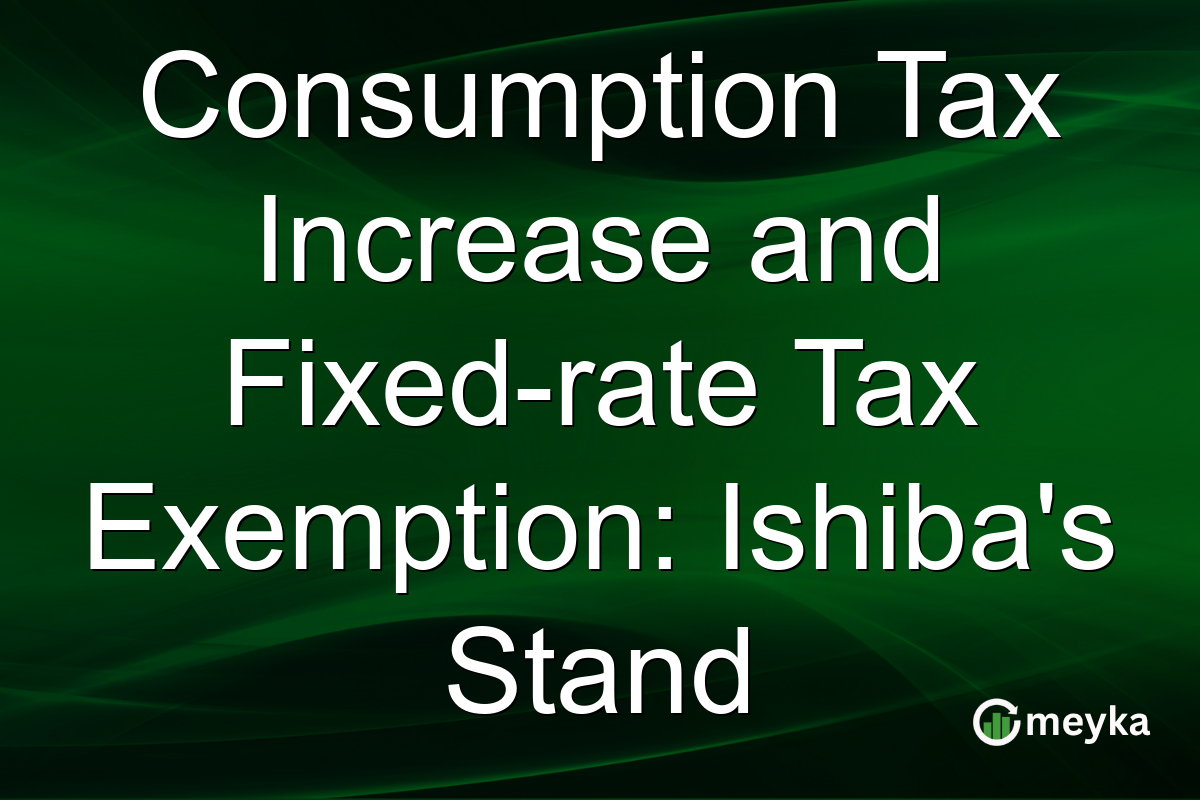Consumption Tax Increase and Fixed-rate Tax Exemption: Ishiba’s Stand
On August 13th, Prime Minister Ishiba addressed key economic issues on an NHK program. He stated clearly that there are no plans to increase the consumption tax or reintroduce fixed-rate tax exemptions. As this decision impacts both the domestic and international economic landscapes, understanding the implications can provide valuable insights for investors. Let’s explore what this means for economic policy and potential considerations for future market trends.
Ishiba’s Economic Stance
Prime Minister Ishiba’s recent announcement provides a clear insight into the government’s current fiscal stance. By asserting that neither a consumption tax increase nor fixed-rate tax exemptions are on the table, Ishiba signals a focus on economic stability. This decision aligns with the cautious approach to maintaining consumer spending power and avoiding potential economic shocks.
Japan’s consumption tax rate currently stands at 10% after previous incremental increases aimed at enhancing tax revenues without stifling consumption. The decision not to raise this rate further is rooted in concerns about household financial strain, especially given the economic impacts of global uncertainties.
Moreover, fixed-rate tax exemptions have historically been used to stimulate economic growth during periods of stagnation. Ishiba’s choice to not pursue this could indicate a belief in more organic recovery processes driven by market forces rather than government intervention.
Economic Implications
The absence of changes in consumption tax policy suggests a period of economic predictability, which can be reassuring amidst global financial fluctuations. A stable consumption tax allows consumers to maintain consistent spending habits, supporting domestic markets without sudden shifts due to altered disposable income.
Investors viewing Japan’s market may find this stability attractive. While the GDP showed modest growth of 2.3% last quarter, bolstering consumer confidence is critical for sustaining economic momentum. The decision to refrain from a tax increase reflects an understanding of Japan’s unique economic challenges, where an aging population and shrinking workforce necessitate careful fiscal policy planning.
Ishiba’s stance underscores the importance of measured economic strategies over aggressive fiscal maneuvers. By avoiding drastic consumption tax hikes or tax exemptions, the aim may be to gradually build economic resilience without overburdening public finance.
Market and Investment Insights
The implications for investors are significant. A steady consumption tax rate assures predictable consumer behavior, an essential factor for market stability. Companies within consumer goods and retail sectors could see sustained demand, avoiding a potential decline that might follow tax hikes.
From an investment perspective, Ishiba’s current fiscal approach invites considerations of long-term stability over short-term gains. The potential for stable economic growth supports a favorable environment for both domestic and international investors. For instance, if we consider the 3.7% increase in retail sector sales in the last fiscal quarter, continued stable consumption patterns can encourage increment in investment.
Furthermore, platforms like Meyka can be instrumental in navigating such fiscal environments. By providing real-time insights and predictive analytics, investors can better understand market directions and economic policies, ensuring informed decision-making.
Future Fiscal Policy Considerations
While Ishiba may have shelved the notion of immediate consumption tax alterations, future policy changes cannot be entirely ruled out. Japan’s long-term fiscal health requires balancing economic growth with public debt reduction. As the national debt remains a pressing issue, strategic taxation reviews might occur in the years ahead.
However, the current focus on consumption stability reflects a commitment to economic recovery without risking domestic market volatility. Sustainability in public finance will likely depend on innovation in tax policy, enhancing revenue without adversely affecting consumer sentiment.
For investors, staying attuned to policy shifts and economic forecasts is essential. Utilizing advanced platforms like Meyka can provide valuable insights into market dynamics and potential fiscal changes, supporting strategic investment plans poised for upcoming adjustments.
Final Thoughts
Prime Minister Ishiba’s decision against immediate consumption tax changes reflects a commitment to economic stability. By emphasizing predictable fiscal policies, the Japanese government aims to cement economic growth without introducing pressures on consumer spending. For investors, this stability offers opportunities and challenges that require close observation of market trends and fiscal policies. Utilizing tools like Meyka can enhance understanding and navigation of these economic landscapes, supporting informed investment decisions moving forward.
FAQs
Prime Minister Ishiba announced that there are no current plans to raise the consumption tax or reinstate fixed-rate tax exemptions in Japan. This signifies a focus on maintaining economic stability.
The decision provides fiscal predictability, supporting stable consumer spending and minimizing market shocks, which can create a favorable environment for investors in the long term.
While current policies aim for stability, Japan’s fiscal health requires addressing public debt and sustaining growth, potentially necessitating future tax policy reviews.
Disclaimer:
This is for information only, not financial advice. Always do your research.






